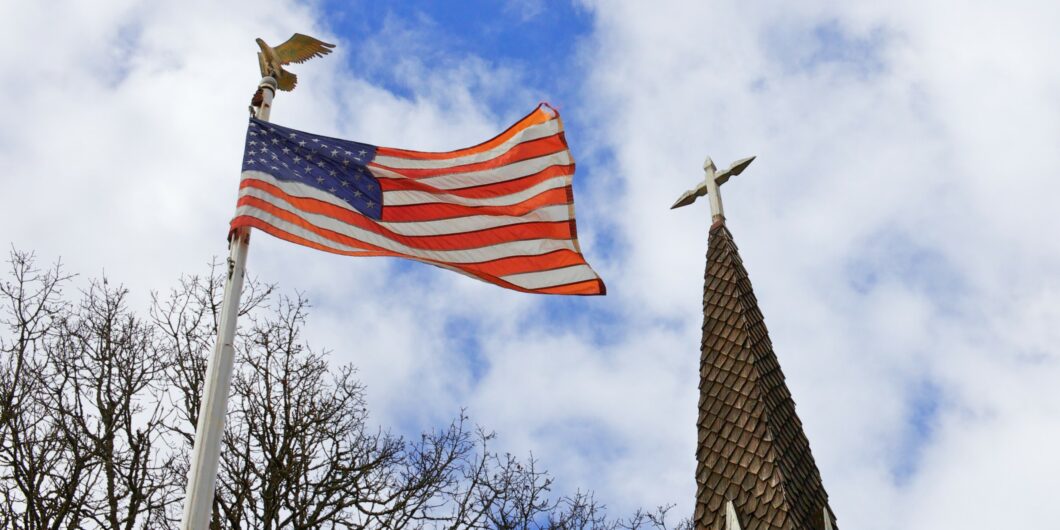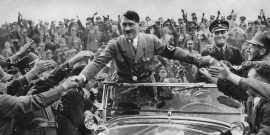Having an intellectually sound opinion about virtue or manliness isn’t enough. We need to be able to live out these truths within our communities.
A Christian Nation?
Can America become a more Christian nation through public school prayer and higher wages for workers? Senator Josh Hawley offers this counsel in a recent First Things article, “Our Christian Nation.”
Commendably, Hawley firmly rejects a “Christian nationalist” desire to inscribe the Apostles’ Creed into civil law or seek a “Protestant Franco.” He rightly warns that self-identified Christian nationalists “regard America’s constitutional project and our long-standing commitment to individual liberty as misguided, as the children of Enlightenment liberalism and somehow foreign to Christianity,” which is “deeply mistaken.” Contrary to Christian nationalist assertions, he points out, “individual freedom” and “constitutional government” result from Christian culture and merit defense.
Hawley wants a nation of “biblical Christianity” and “Christian politics” but oddly omits the church’s role in shaping society. An over 4000-word article only mentions “church” 3 times, and even there, peripherally. How does a Christian nation emerge, much less endure, without strong churches? Civil Society is missing from his analysis, implying, maybe unintentionally, that the nation’s religion is chiefly an expression of governmental policy. A more traditional American perspective would originate religion in civil society but understand and affirm that the population’s religiosity inevitably is reflected in public policy. For example, if most members of a community strongly want to restrict alcohol sales on Sundays, their local government will likely oblige.
Spirituality is also largely missing from the article. Instead, his “Christian nation” project is described as a cultural-political endeavor. But how successful can such a project be when Christian affiliation and vitality in America are decreasing? Are not our culture and politics largely reflections of that decrease? Aren’t churches and individual Christians, in their failure to transmit the faith more widely, ultimately responsible for this decline in Christian influence?
This failure is not mentioned by Hawley. Instead, he describes growing “arid secularism” in America as an imposition of the left, leaving “no moral order to bind us together.” He accurately notes that the “rights we cherish, the freedoms we enjoy, the ideals we love together—all are rooted in and sustained by the tradition of the Bible.” He insists our country’s future requires renewing the “influence of biblical faith in America.”
Hawley derides the “fusionism” of the past combining “anti-communism, free-market economics, and social conservatism,” which incorrectly taught “Christians that their faith was relevant only to ‘cultural issues.’” This perspective disconnected “social norms and economic policies,” he claims. Every society needs a specified moral order. And renewal for America means seeking a society that again reflects the “principles of the gospel.”
In contrast, Hawley says, “liberal intelligentsia” and “some conservatives” now believe government “must be neutral about competing conceptions of the good life.” Any nation’s life is a “moral enterprise.” A mere “procedural republic” offering rights that allow free individual choices is a “mirage,” he says. “Neoliberals,” he claims, think the free market can unite society through “moneymaking,” while other conservatives think the Constitution by itself can operate without moral purpose. Citing James Madison, Hawley says no constitutional order can endure absent a “common conception of the good.” Christians are dutybound to “work for a just society leavened by the gospel,” now more urgent than ever, including “the rights to worship, to marry, to pursue an honest profession, and to live generally in a manner pleasing to the Lord.”
America has never had a Christian “national establishment,” Hawley admits. But our national habits were “Christianly shaped,” he notes, “which is a good thing, maybe especially for Americans who are not Christians. Precisely because of this Christian influence, American society has protected the liberty of all to speak, to worship, to assemble and petition, to share in self-rule.” But the “atheist left” advocates a “religion of secularism and state.”
The response should not be religious establishment, Hawley says, but dismantling the “legal regime of secularism.” This means public school prayer, allowing “religious devotion in the workplace,” freedom of expression for Christian businesses, and honoring Christian “heritage” in public places, such as displaying the Ten Commandments in courthouses.
Imposition and symbolism are unlikely to generate genuine, much less sustainable, religious belief and are more likely to promote cynicism and even hostility towards religion.
“Christian politics” should advocate in “unapologetically Christian terms,” beyond “tired talk” of “family values,” especially by seeking a “Christian economy.” This project entails rebuilding the industry with good wages, rewarding marriage and family with tax policy, stopping exploitation by the pharmaceutical industry, and crushing control of “public discourse by Big Tech.”
Hawley concludes: “America has been a Christian nation. We can be again—if Christians will recover again their confidence that the gospel of Jesus Christ speaks to every facet of our common life. For the future of the nation, and the honor of the gospel, we must.”
There is much that is laudable in Hawley’s diagnosis if not so much in his prescription. Much of America’s public life is shifting away from biblical transcendence towards either rabid secularism or stridently “woke” utopian fantasies with religious zeal while denying religion’s power. Unmentioned by Hawley is a growing post-Christian right that is indifferent to Christian doctrines and ethics but exploits Christianity as a tribal identity against leftist enemies. He is unfair about earlier versions of politics from a traditional Christian perspective that supposedly focused on culture while ignoring economics.
The 1980s and 1990s Religious Right was deeply influenced by Presbyterian cultural critic Francis Schaeffer, Baptist theologian Carl Henry, Catholic philosopher Michael Novak, and Lutheran/Catholic editor and writer Richard Neuhaus. They advocated a synthesis of traditional morality, democratic constitutionalism, and free market economics as the preferred alternative to planned economies. Their ideas are out of fashion in our time, but they were also out of fashion when first proposed. Hawley dismisses their perspective without contending with it. He implies they left economics outside their spiritual concern. But they advocated for private enterprise not just as more productive than statism, but as better exemplifying God-given human creativity.
Hawley advocates for a specifically “Christian” politics, which this earlier generation was somewhat reluctant to do. Jerry Falwell Sr., a key founder of the late 1970s/1980s Religious Right, founded the Moral Majority as a pan-religious coalition of moral conservatives. Schaeffer, who inspired Falwell, described American democracy as the fruit of the Reformation’s hostility to concentrated power, civil or religious. He advocated for a Protestant sensibility in politics without necessarily demanding or expecting a “Christian” politics or a Christian America. Novak and Neuhaus, from their Catholic perspective, argued from natural law and church teaching for a Christian-friendly pluralism.
Perhaps, and even likely, Hawley does not entirely disagree with their version of Christian-friendly pluralism. But he does seem to expect a more specifically Christian kind of politics for a more specifically Christian-identified America. He does so even though Christians have a smaller population share than in the years of the earlier Christian right. It’s unclear how he expects to achieve his goal of a more Christian America. Public school prayer, whether mandatory or voluntary, conducted by today’s public schools, is an unlikely remedy. So too are more civic displays of the Ten Commandments. Imposition and symbolism are unlikely to generate genuine, much less sustainable, religious beliefs and are more likely to promote cynicism and even hostility toward religion. And protecting the free speech of religious people in the workplace is already a consensus view among nearly all conservatives, backed by most judicial rulings.
Earlier Christian conservative thinkers like Schaeffer, Henry, Neuhaus, and Novak assumed that society was shaped in part by churches. They contended for vitality and doctrinal integrity within the church. They were concerned about evangelism and effective discipleship. “Christian” politics are irrelevant if there are fewer and fewer Christians to advocate for them. And, of course, politics for Christians is only one fruit of their faith, it is far from the main focus, which is salvation and holiness.
Schaeffer, Henry, Novak, and Neuhaus were encouraged by the decline in progressive religion and an upsurge in evangelicalism and traditional Catholicism in the 1970s and 1980s, which they saw as an opportunity for wider social renewal. The American climate is quite different today. Religious affiliation and worship attendance are declining. Nearly all denominations, conservative and liberal, are shrinking, as is much of US Catholicism. Nondenominational Christianity is growing but is often unmoored to church tradition and may actually contribute more to polarization than to constructive “Christian politics.”
Maybe one key to social renewal is educating this new brand of post-denominational evangelicalism in the social insights of Protestant and Catholic traditions. But even more important is reversing church decline in America. Any concern about a Christian America should begin with evangelism, discipleship, charitable works of mercy, and the construction of lasting Christian institutions to replace dying denominationalism.
Developing a politics rooted in traditional Christian insights that can inform believers is always important. But pretending that America can become more Christian through politics when the church is mostly in retreat is unreasonable. America will be more Christian when more Americans take Christianity seriously, a task for which politics is profoundly ill-equipped. Alexis de Tocqueville credited the wide popularity of religion in America in contrast to Europe, where religion was often deemed the ally of political forces, to American religion’s nonpartisanship. As historian Mark Noll recently explained, Methodism became America’s largest church in the Second Great Awakening because it was largely non-political, although its rise had enormous social impact.
The senator’s faith can be appreciated. But bringing America to God is the project of preachers, not politicians. And if the scriptures are true, it begins not so much as a call to arms but as a summons to humility with sackcloth and ashes.



